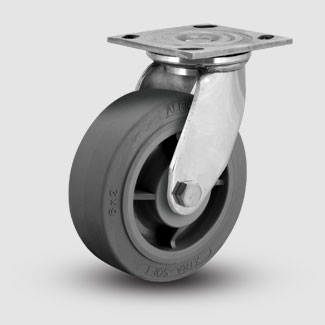Choosing a Caster

Selecting
the proper wheel and caster insures maximum productivity and Minimizes
long term costs, & provides the greatest return on investment. Rely
on BuyCasters.com's knowledge and experience help assist your
Maintenance, Engineering and Purchasing Departments. Contact one of our talented sales professionals today. 1855-WHEEL11
Factors to Consider ...
Safety & Ergonomics:
A human being has to push or pull castered equipment; with that in mind,
here are a few helpful facts: the larger the wheel diameter, the easier
it will roll; wheels with anti-friction bearings (tapered, ball, or
roller) roll easier than wheels with a plain bore or Delrin bearings.
Try to select the largest practical wheel diameter and anti-friction
bearings if the application will permit. Using these tips, helps insures
that you will maximize efficiency and productivity, and reduce work
related injuries. Numerous factors need to be considered.
Load Capacity:
The first questions usually asked pertains to what the total weight to
be moved is (includes the weight of the cart or equipment & the load
it will be carrying) and on how many casters. The simple formula is;
divide the total load weight by the number of casters or wheels you will
use; that will tell you the load capacity you will need for each caster
or wheel.
Total load ÷ Number of Casters or Wheels on Cart = Minimum load Capacity
Per Caster or Wheel
Be aware that the best combination of wheel, bearings, and caster frame
requires more knowledge than just the load capacity rating. Our load
capacity ratings are based on a speed of up to 2.5 mph intermittent
usage over smooth floors in ideal operating conditions. Your application
is seldom ideal. Did you know that heat generated from a heavy load
being moved at a higher speed can cause the bonding agent which holds
the tire on the wheel center to break down? The result can be tire
separation and wheel failure.
Floor Protection:
In order to determine the proper wheel for your application, you
need to consider the type and condition of the floors they will be
rolling on. Wheels with soft non-marking rubber treads (tires) provide
the best floor protection on hardwood floors, such as in your home or in
a school gymnasium. Wheels with Polyurethane treads provide floor
protection when soft rubber wheels lack the needed capacity. There are
also countless applications where only a hard non-metal or metal wheel
will do the job. Remember that repetitive travel over the same path with
wheels having a hard surface will eventually wear the surface of even
concrete floors. Each of our wheels have numerous applications for which
they are best suited.
Operating Conditions:
Other factors to consider when selecting a caster or wheel are: is
abuse, impact or shock loads likely; is noise a factor; what speed will
it be rolling; will the equipment be moved manually or by mechanically
powered equipment; will they be used in temperature extremes hot/cold;
will they come in contact with water, chemicals, oil/grease; will they
be rolling over debris, cords, floor joints, etc; what is the condition
and types of the floor surfaces (smooth, rough, uneven, broken concrete,
coated concrete, asphalt, gravel, grass, carpet, hard- wood, linoleum,
tile, etc). Each wheel type can be used in many different applications,
and there are countless applications. We urge you to read the pages
describing each of our wheels and casters. If you still have questions
or wish to confirm your choice, please Contact our Sales Department.
Extreme Climate:
We offer a broad selection of wheels capable of withstanding a
wide range of temperatures from -50° F, to 1,300° F. Please be aware
that standard bearing grease will begin to harden at 20° F preventing
bearings from optimum functionality. Both high temperature and low
temperature grease is available, please inquire. High temperature casters and wheels are often used in bakeries, ovens and autoclaves.
Cost Efficiency Analysis:
Initial cost is an important factor in a purchase decision; however the
fact is that choosing the least expensive casters that meet your
requirements can save money up front; but may actually cost you more in
the long term; including the cost for maintenance, down time, and
replacement. Selecting stronger casters with a higher weight capacity,
large wheels, and better bearings insures maximum productivity and
longer caster life. For instance using stainless steel casters versus regular zinc coated will ensure a longer life when used outdoors or in wet applications. Or using a kingpinless caster when the carts or dollies are subject to extreme side loading or thrusts.
|
|
|